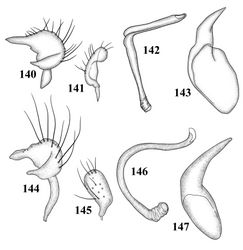Tytthus juturnaiba
| Notice: | This page is derived from the original publication listed below, whose author(s) should always be credited. Further contributors may edit and improve the content of this page and, consequently, need to be credited as well (see page history). Any assessment of factual correctness requires a careful review of the original article as well as of subsequent contributions.
If you are uncertain whether your planned contribution is correct or not, we suggest that you use the associated discussion page instead of editing the page directly. This page should be cited as follows (rationale):
Citation formats to copy and paste
BibTeX: @article{Henry2012ZooKeys220, RIS/ Endnote: TY - JOUR Wikipedia/ Citizendium: <ref name="Henry2012ZooKeys220">{{Citation See also the citation download page at the journal. |
Ordo: Hemiptera
Familia: Miridae
Genus: Tytthus
Name
Tytthus juturnaiba Carvalho & Wallerstein – Wikispecies link – Pensoft Profile
- Tytthus juturnaiba Carvalho and Wallerstein 1978[1]: 256 (orig. descrip.); Schuh 1995[2]: 249 (cat.).
Diagnosis
Based on the original description and adult habitus illustration, this species can be distinguished by the overall dark color with the cuneus, embolium, and the narrow outer edge of the corium pale yellow, the medially fuscous membrane, the dark antennal segment I with only the apex pale, and the pale antennal segment II with the apex fuscous. This combination of characters places Tytthus juturnaiba near the North American Tytthus vagus, but differs in having an apparent pale yellow antennal segment II, with only the apex black, and uniformly pale yellow legs, whereas Tytthus vagus has a uniformly black antennal segment II, and the hind femur is fuscous on the apical two thirds.
I have, however, studied a photograph of the holotype of Tytthus juturnaiba stored in the PBI Heteroptera Species Database (http://research.amnh.org/pbi/heteropteraspeciespage/popupimage.php?imagename=AMNH_PBI 00174988.jpg) that appears to indicate that antennal segment I actually is pale at the base and apex (not just pale at the apex) and segment II is uniformly dark (not yellow, with the apex fuscous). Based on this photograph, which contradicts the antennal characters described in the original description, Tytthus juturnaiba almost certainly is conspecific with Tytthus neotropicalis and would run to this species in my key. Nevertheless, I refrain from making a formal synonymy until I can examine the holotype (which was unvailable at the time of this study) deposited in the Museu Nacional, Rio de Janeiro, Brazil.
Description
Holotype male (based Carvalho and Wallerstein 1978[1]): Length to apex of hemelytron 2.90 mm, width across hemelytra 0.90 mm. Head: Length 0.20 mm, width across eyes 0.60 mm, interocular width 0.28 mm. Antenna: Segment I length 0.30 mm, II 0.80 mm, III 0.50 mm, IV missing. Pronotum: Length 0.40 mm, basal width 0.80 mm. Cuneus: Length 0.40 mm, basal width 0.28 mm.
Coloration (based on Carvalho and Wallerstein 1978[1]): General coloration black, outer margin of exocorium, embolium, and cuneus pale yellow; middle of membrane fuscous; antenna pale yellow, segment I (except extreme apex) and apex of segment II black. Undersurface black. Legs pale yellow.
Structure, texture, and vestiture (based on Carvalho and Wallerstein 1978[1]): Information not given.
Male genitalia (based on Carvalho and Wallerstein 1978[1]): Left paramere (Fig. 140): Mitt-shaped; right arm longest; left arm shorter, spinelike. Right paramere (Fig. 141): Elongate oval. Endosoma (Fig. 142): Strongly C-shaped, bent at middle. Phallotheca (Fig. 143): Broad, apically acute.
Female (based on Carvalho and Wallerstein 1978[1]): Length to apex of hemelytron 3.20 mm, width across hemelytra 1.00 mm. Head: Length 0.20 mm, width across eyes 0.50 mm, interocular width 0.28 mm. Antenna: Segment I length 0.20 mm, II 0.80 mm, III and IV missing. Pronotum: Length 0.40 mm, basal width 0.90 mm. Cuneus: Length 0.44 mm, basal width 0.28 mm.
Host
Unknown.
Distribution
Described and known only from the holotype and allotype taken at Logoa Juturnaiba, Araruama, Estado do Rio de Janeiro, Brazil, Nov. 1976 (Carvalho and Wallerstein 1978[1]).
Specimens examined
None.
Taxon Treatment
- Henry, T; 2012: Revision of the Plant Bug Genus Tytthus (Hemiptera, Heteroptera, Miridae, Phylinae) ZooKeys, 220: 1-114. doi
Other References
- ↑ 1.0 1.1 1.2 1.3 1.4 1.5 1.6 Carvalho J, Wallerstein P (1978) Mirídeos neotropicais, CCXIV: Descrições de seis espécies novas (Hemiptera). Revista de Brasileira Biologia 38: 251-258.
- ↑ Schuh R (1995) Plant Bugs of the World (Insecta: Heteroptera: Miridae). Systematic Catalog, Distributions, Host List, and Bibliography. New York Entomological Society, New York. 1329 pp. (http://research.amnh.org/pbi/catalog) [accessed during preparation of ms. through Sept. 2011].
Images
|
